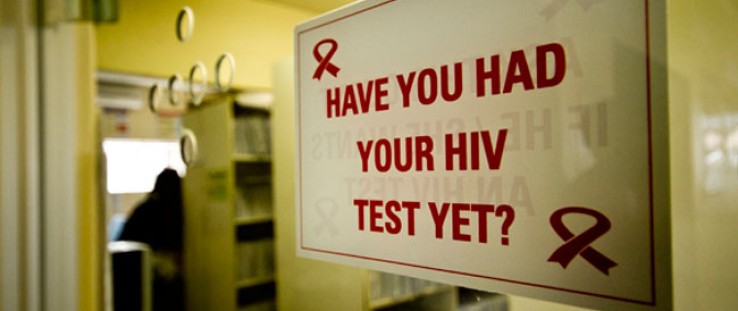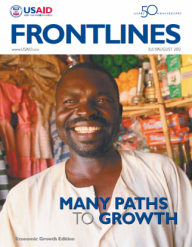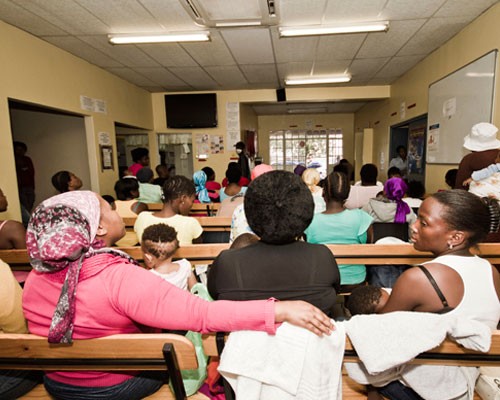 Strengthening linkages between patients, communities and medical facilities is paramount in the prevention and treatment of HIV/AIDS. Pictured: a health clinic near Cape Town, South Africa.
credit: Kheth’Impilo
Strengthening linkages between patients, communities and medical facilities is paramount in the prevention and treatment of HIV/AIDS. Pictured: a health clinic near Cape Town, South Africa.
credit: Kheth’Impilo
 Strengthening linkages between patients, communities and medical facilities is paramount in the prevention and treatment of HIV/AIDS. Pictured: a health clinic near Cape Town, South Africa.
credit: Kheth’Impilo
Strengthening linkages between patients, communities and medical facilities is paramount in the prevention and treatment of HIV/AIDS. Pictured: a health clinic near Cape Town, South Africa.
credit: Kheth’Impilo
Strengthening linkages between patients, communities and medical facilities is paramount in the prevention and treatment of HIV/AIDS. Pictured: a health clinic near Cape Town, South Africa.
Halting the global AIDS pandemic takes more than just a pill, a doctor or a clinic.
The real fight against HIV starts with families, schools and villages. It begins in communities—where attitudes and opinions take shape early on and influence the people and families affected by HIV.
“Communities play a significant and fundamental role in influencing patient receptiveness to accessing, adhering and benefitting from HIV/AIDS services,” says Roxana Rogers, director of USAID’s Office of HIV/AIDS. Through its long history of working in this area, USAID has put a strong focus on communities in combatting HIV/AIDS.
Twenty-three-year-old Thembi*, who lives in an informal settlement near Cape Town, South Africa, first learned she was HIV-positive in 2009 when she was pregnant with her daughter, Mackenzie*. After learning of her status at a routine prenatal check-up, Thembi, a single mother, was frightened and shocked. She worried about her own health and the health of her baby.
“In my culture, the community believes once you know you have HIV, that is when you become sick,” she said.
According to UNAIDS, South Africa has the largest HIV epidemic in the world, with approximately 5.6 million people of the 48.8 million population (11.5 percent) living with HIV nationwide in 2009. That same year, the adult HIV prevalence in South Africa was 17.8 percent.
Thembi was initially in denial about her disease. She decided to leave home to give birth to her baby. But without treatment to prevent mother-to-child transmission of HIV, both mother and daughter became sick.
No longer able to avoid confronting her HIV status, Thembi returned to a USAID-funded clinic in her home town for medical help. Thanks to support from a local South African organization, Kheth’Impilo, which means “choose life,” the clinic provided Thembi and her daughter with medical care and treatment.
As part of her care, Thembi was introduced to a patient advocate named Nomsa*—a woman from Thembi’s community who provides support to people living with HIV and AIDS.
Nomsa helped Thembi and her daughter enroll in medical treatment and educated Thembi on the importance of adhering to her daily regimen of antiretroviral (ARV) drugs. Thembi’s and Mackenzie’s health improved almost immediately—both quickly gained weight and their viral load decreased significantly.
Patient advocates like Nomsa work with people living with HIV and AIDS to address barriers to treatment adherence—including disclosure and substance and alcohol abuse—and provide important psychosocial support to patients through one-on-one counseling and home visits.
“Patient advocates are important to the success of a community and help women, children, and families living with HIV stay healthy and follow their treatment regimens, while also providing necessary emotional support,” said Nomsa.
Through Kheth’Impilo, patient advocates are supported by qualified and auxiliary social workers who form an important link between the clinic and communities. “Patient advocates are critical to improving people’s access to quality health-care services within the public health system, particularly given the challenges around access in rural areas of South Africa,” said Dr. Ashraf Grimwood, CEO and founder of Kheth’Impilo.
Communities on the Front Lines
Women like Thembi who are living with HIV and AIDS often learn of and participate in health services through their communities—often their primary source of information and support—as well as through other people living with HIV and AIDS.
Community support takes many forms—from patient advocate programs like the one Thembi participated in, to other activities that provide care and support for people living with and affected by HIV, including children orphaned and made vulnerable by AIDS.
Services like home-based care, economic-strengthening programs, and treatment scale-up and prevention interventions are areas where communities engage with people living with HIV and AIDS. Community volunteers, peer educators and community health workers are at the forefront of these efforts.
In sub-Saharan Africa, where there are critical shortages of trained health-care professionals, strengthening linkages between patients, communities and medical facilities is paramount.
Working with local communities also helps reduce stigma involved in HIV/AIDS services; strengthens psychosocial support for patients; improves referral systems to connect HIV-positive women, children and men to medical care and treatment; and reaches underserved, marginalized and hard-to-reach populations.
Involvement at the grassroots level is particularly critical to combating stigma and discrimination, an ongoing reality that still exists in many regions hit hardest by the epidemic. Empowering local leaders who are influential and can spread positive messages on the importance of seeking appropriate medical care can be a highly effective way to reduce stigma and help people living with HIV access the care they need.
“Without community support, misinformation and myths about the disease may spread through communities—and have a negative impact on people living with HIV and AIDS,” said Mokgadi Malahlela, head of community services and co-founder of Kheth’Impilo.
Empowering Local Communities
“Over the last 30 years, USAID has been a strong proponent of programs that empower communities by improving treatment adherence and outcomes, and strengthening the health system and core community structures,” said Ugochukwu “Ugo” Amanyeiwe, USAID’s senior technical officer for community care and prevention for people living with HIV/AIDS.
With USAID’s support, local organizations like Kheth’Impilo in South Africa are engaging communities to play an instrumental role in the HIV/AIDS response.
Providing critical health services in districts with a high prevalence of HIV and tuberculosis (TB), Kheth’Impilo supports the national government in its efforts to scale-up HIV/AIDS services—including prevention, care and treatment— in 142 clinics and eight districts across South Africa, enrolling around 30,600 people in treatment, providing care and support for 146,000 people, and screening about 39,500 pregnant women for prevention of mother-to-child transmission services.
Kheth’Impilo provides HIV counseling and testing, prevention of mother-to-child transmission services, patient-wellness services, and HIV and TB treatment for adults and children.
The organization also employs, trains and mentors patient advocates. To date, Kheth’Impilo has trained over 3,000 community workers and hired 600 patient advocates to provide community adherence support as well as psychosocial support for both adults and children living with HIV and TB. Apart from the positive impact patient advocates have on health in their communities, employment allows them to support their families.
Recent research conducted by Kheth’Impilo shows a 36-percent improvement in the number of patients with a suppressed viral load—reflecting an uptick in patients adhering to their treatment regimens—at sites supported by patient advocates. Patients supported by advocates also show a 38-percent improvement in survival over the course of 60 months compared to those without advocates, and 80 percent remain on treatment and are thriving after five years of patient advocate support.
“These are incredible results and further illustrate the integral role the community can play in the global response to HIV and AIDS,” says Rogers.
From Patient to Advocate
Those who receive patient support from the program also have a tendency to pay it forward. Thembi’s experience working with Nomsa inspired her to become a patient advocate herself to help other people living with HIV and AIDS.
“I need to help people; they get sick and sometimes die because they did not know any better,” Thembi explains. She wants people living with HIV and AIDS to know that they’re not alone.
Today, Thembi and her daughter are healthy, happy and thriving. Thembi continues to give back to her community, and is currently enrolled in phlebotomy training to learn how to draw blood, which is supported by Kheth’Impilo and USAID.
“I’m excited to be doing this training,” says Thembi. “It will help me grow and build my skills into a career that will benefit my community even more.”
*Complete names withheld and/or changed for privacy reasons.










Comment
Make a general inquiry or suggest an improvement.